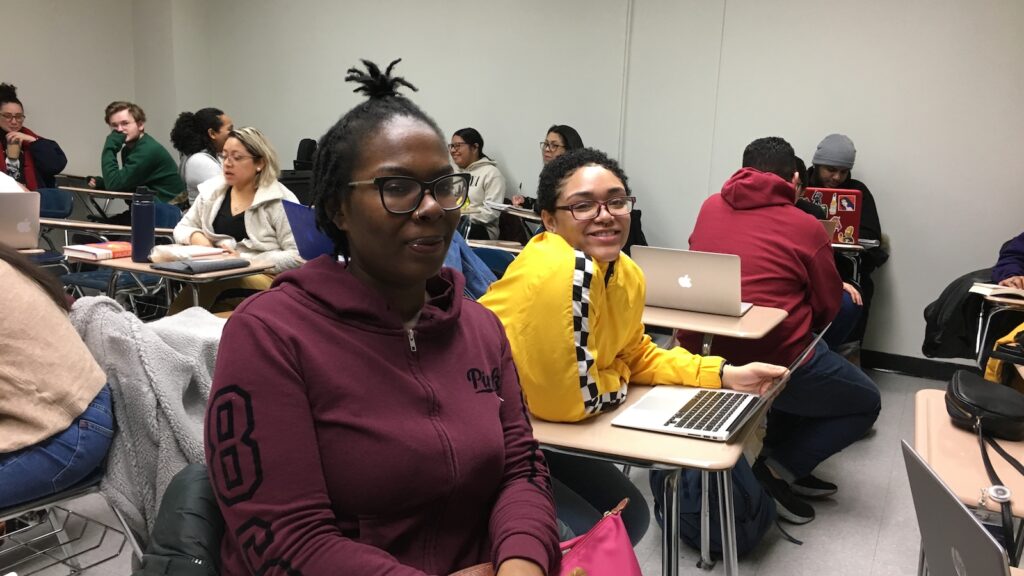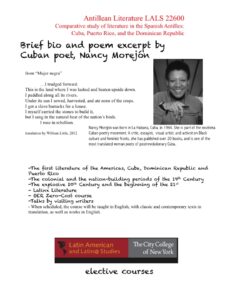Following is a comprehensive list of courses offered in Latin American and Latino Studies. Please check the current Schedule of Classes for a listing of the courses offered this semester.
Introductory Electives
10100: The Heritage of the Spanish Antilles
The historical, cultural and ethnic forces that have shaped the character of the Hispanic people of the Caribbean. The variety of societies and cultures of the Hispanic Caribbean in their historical and contemporary setting up to and including the migration of Caribbean people to urban North America. 3 HR./WK.; 3 CR.
10200: Latin American and Caribbean Civilizations
A survey of Latin America’s economic, social, political, and cultural development from the Pre-Columbian era to the present. The course will focus on selected topics and themes including: colonization and resistance to colonization; the formation of social structures and labor systems; patterns of dependent development; reform, revolution, and counter-revolution. 3 HR./WK.; 3 CR.
12300: Dominican Heritage
A survey of the cultural development of the Dominican Republic from pre- Columbian times to the present. Special consideration will be given to socio-economic and political developments and the relationship that exists between the Dominican Republic and the United States. 3 HR./WK.; 3 CR.

Advanced Electives
12600: Hispanics in the United States: Migration and Adjustment
This course will discuss the challenge that the multifaceted Latino/a-Hispanic reality poses to the anglo-european and monocultural conception of the United States. . In our approach, we will shift perspectives to the myriad identities that in fact constitute the U.S. We will read and discuss texts on the socio-economic and political origins of migration from Latin America and the Spanish speaking Caribbean to the United States, as well as the historic Latino/a-Hispanic presence pre-dating the expansion of U.S. territories. The course will discuss key concepts such as a multi-racial latinidad, first and 2nd-3rd generation Latinos/as, the politics of gender, homophobia, imperialism, neoliberalism, militarization, circular migration, illegality, borderlands, ethnic enclaves, and the immigrant consciousness. 3 HR./WK.; 3 CR.
13100: The Hispanic Urban Child
A survey of the sociological, psychological and educational needs of Hispanic children in the New York City public schools. Emphasis will be given to the study of language problems, family structure, race relations and community life. (W) 3 HR./WK.; 3 CR.
13200: The Contemporary Hispanic Family
A study of change in Hispanic family structure from the early colonial period to the present day. Stress will be placed on moral values, religious beliefs, interpersonal relations, and family organization. 3 HR./WK.; 3 CR.
22600: Antillean Literature
Comparative study of literature in the Spanish Antilles. Special emphasis on contemporary works. Class conducted in Spanish. 3 HR./WK.; 3 CR.

Featured author – Antillean Literature
23800: Dominican Heritage: From Trujillo to the Present
An in-depth study of the sociocultural and historical realities of the Dominican Republic from 1930 to the present. The course will also cover the Dominican migration and the growth of the Dominican community in the United States. 3 HR./WK.; 3 CR.
27100: Social Welfare in the Hispanic Community
A study of the social welfare system as it affects Hispanics and other minorities. Changing concepts of social welfare in the United States, Spain and Latin America from Juan Luis Vives to the present. (W) 3 HR./WK.; 3 CR.
29100: Culture and Health: Hispanics and Other Minorities
Different cultural values and beliefs will be examined as they relate to illness, treatment of the sick, readjustment, rehabilitation, health maintenance, and prevention. Emphasis on case studies of culture clash. Incorporating or rejecting cultural beliefs in planning health education and change. (W) 3 HR./WK.; 3 CR.
29200: Health Care Planning and the Hispanic Experience
The economic, social, political and ethical issues involved in planning health programs. Comparison of health care programs as they affect Hispanics and other minorities. (W) 3 HR./WK.; 3 CR.
31201: Language, Race, and Society in LatinX Communities
In this course we will reflect on the role of language in the construction of identity of Latinx in the United States. We will discuss how Spanish is used as a subordinate language in the US, and how this affects the ways in which Latinx see themselves and are discriminated and marginalized. Based on the concepts of race, identity, and symbolic capital, and the use of ‘glottopolitics,” the politics of language, we will analyze how language is not only a means an instrument of power over a minoritized group but also how Latinx use language to resist discrimination and empower themselves.
LALS 31210: Gender, Race and Latinidad
This course will study the concepts of identity and subjectivity as Latinidad; how we have come to define Latinidad and what are its implications. Drawing on a variety of interdisciplinary sources we examine how racial definitions, gender, and connections to a national identity have historically and in recent times, through critical world events, intersected in the production and representation of Latinidad. Historically, we will examine how people connect with the concept of Latinidad in order to form a unifying collective identity as a political strategy, but also how such projects have the potential for collusion with racist State oppression.
LALS 31250: Narratives of Displacement and Border-Crossings in Latin America
An exploration of the contested space of Latin American history of coloniality, and the representation of displacement, border-crossings, and diaspora through narrative, oral history, popular song, photography and film. We will examine the history of the borders in Latin America, similarities and differences among its various communities, through linguistic, racial, and gender perspectives.
LALS 31999: Music and Film in Afro-Latin America
An overview of the Afro-Latin American cultural legacy through music and film, and its contemporary influence in Latin America, the Caribbean, and the U.S. The course will study the development of Afro-Latin American cultures, especially in Brazil, Perú and Cuba, as well as their history and patterns of migration and diaspora through artistic expressions.
30100-30400: Honors
Advanced independent work for outstanding majors in their upper junior and senior years. Honors will be granted to graduating seniors on the basis of research and a comprehensive written examination. Admission to the Honors course requires (a) a 3.2 average in courses taken in the Latin American and Hispanic Caribbean Studies Program since the freshman year and (b) approval of the Honors Supervisor. Application for admission must be made no later than December 10 in the Fall term and May 1 in the Spring term. VARIABLE CR.
31000: Independent Studies
Independent research under the supervision of LALS faculty. Open to students in their senior year only, or with permission of LALS advisor. HRS. TO BE ARRANGED; 1-4 CR.
31100-32000: Selected Topics
Advanced study in selected topics related to Latin American and Hispanic Caribbean Studies. Prereq.: to be established by the instructors. 3 HR./WK.; 3 CR.


